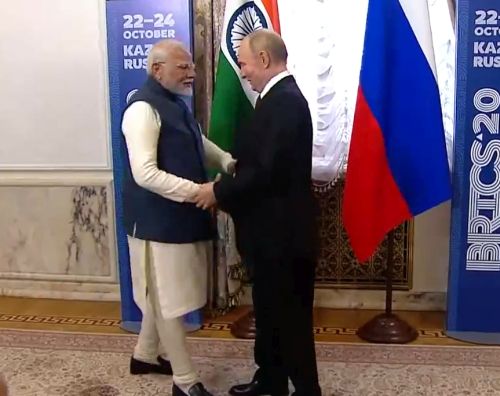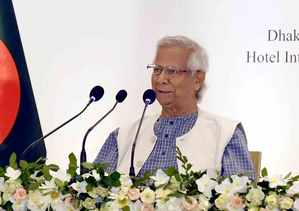International
Bharat's security prowess unsettles West-centric global security dynamics
New Delhi, May 28 (IANS) Over the past year, India has found itself at the epicentre of Western allegations, coupled with old friend camaraderie with Pakistani generals accusing Indian officials of undermining the sovereignties of nations by purportedly engaging in the termination of terrorists in Canada, the US, and Pakistan.
This intimidating interest in alleged Indian clandestine security operations, raises pivotal questions about the underlying motives and the broader global dynamics at play. Concurrently, it signals India’s ascendance in the realm of global security as a revitalised and influential force, unsettling the traditional West-centric world order.
In an era where the global threat landscape is increasingly complex, global and interconnected, India’s extraordinary criminal justice measures to neutralise terrorists over the past decade – such as the September 29, 2016 surgical strike on terror launchpads across the Line of Control in Pakistan-occupied Kashmir, and the 2019 airstrike on the Jaish-e-Mohammed training camp in Balakot, Pakistan – are particularly significant.
Under the leadership of Prime Minister Narendra Modi, these operations had shed the “outdated and reluctant” image of Indian security agencies of the past, showcasing new India’s capability and resolve. The operations were conducted with a notable degree of professionalism, responsibility and transparency, as the Indian PM informed his Pakistani counterpart before disclosing them to the world. These actions not only announced Bharat’s arrival as a formidable security force, but also challenged the traditional West-centric world order.
Recent Western allegations, devoid of substantive evidence as seen in opinion-heavy reporting of ‘The Guardian’ claiming India’s role in tens of terrorist terminations in Pakistan, a covert unseen Five Eyes network intelligence report regarding the killing of Canadian terrorist Hardeep Singh Nijjar and subsequent local vote-bank influence as evidenced in Canada, along with the case involving the alleged attempted assassination of Gurpatwant Singh Pannun, the US-based face of the proscribed terrorist entity Sikhs For Justice (SFJ), appear to be part of a broader strategy aimed at exerting collective pressure and undermining India’s assertive stance against terrorism.
India which has long been a victim of cross-border terrorism orchestrated by Pakistan and its extensive global terror network, which includes Canadian and American terrorists.
Canadian terrorists like Talwinder Singh Parmar of Babbar Khalsa masterminded the 1985 bombing of Air India Flight 182, claiming 329 innocent lives.
Similarly, American terrorists like David Coleman Headley and his Canadian accomplice Tahawwur Rana played pivotal roles in the dastardly 2008 Mumbai attacks by Lashkar-e-Taiba, resulting in 175 deaths and over 300 injuries.
More recent attacks, such as the 2016 Uri assault by Pakistan-backed Jaish-e-Mohammed, which killed 19 Indian soldiers and injured 30, and the 2019 Pulwama suicide bombing by Jaish-e-Mohammed and Lashkar-e-Taiba, which took the lives of over 40 Indian police personnel, underscore the persistent threat India faces.
In this context, India’s measures acknowledged criminal justice measures like those listed above to protect itself are not only moral and lawful but also a national security imperative. However, the coordinated Western and Pakistani allegations involving unravelings like Nijjar’s assassination in Canada, an attempted assassination of Pannun, and tens of terrorist killings in Pakistan appear more fixed on challenging the newfound capabilities of India’s security apparatus under Prime Minister Modi. This stance appears discordant with traditional security superpowers that often perceive national security as their exclusive domain.
Most importantly, India’s strategic partnerships with various nations, including those in the West, are built on mutual respect and shared interests. These alliances are grounded in a mutual commitment to promoting global stability, economic development, and security. However, for these relationships to thrive and be truly effective, they must be free from unwarranted accusations and intimidation that can undermine trust and cooperation.
Unsubstantiated allegations and politicised narratives not only strain diplomatic ties but also detract from the collaborative efforts needed to combat terrorism effectively.
By fostering an environment of mutual trust and respect, Western nations and India can work together to dismantle terrorist networks, prevent radicalisation and enhance global security.
In conclusion, it is imperative that Western nations avoid actions that could be perceived as coercive or dismissive of India’s security concerns. Instead, they should prioritize engagement that is based on equality, respect, and a shared commitment to eradicating terrorism. By doing so, they not only reinforce their alliances with India but also bolster the collective ability to address and overcome the multifaceted challenges posed by terrorism in the 21st century. It is time for the international community to support India’s efforts to create a secure and stable world, acknowledging that a strong and secure Bharat is beneficial for global peace and prosperity.
(The author is the research director of Delhi based think-tank, Centre for Integrated and Holistic Studies)
–IANS
pawa/svn
International
Lee Hsien Yang seeks refuge in United Kingdom

Lee Hsien Yang, the youngest son of Singapore’s founding father, the late Lee Kuan Yew, announced on Tuesday that he is now a political refugee in the United Kingdom after seeking asylum from the British government “as a last resort.”
“I remain a Singapore citizen and hope that someday it will be safe to return home,” Lee stated in a Facebook post, as reported by Channel News Asia (CNA).
Citing what he described as the Singapore government’s “attacks” against him, Lee, who is the younger brother of former Prime Minister Lee Hsien Loong, revealed that he sought asylum protection in 2022.
Lee Hsien Yang and his late sister, Lee Wei Ling, who passed away earlier this month, have been in conflict with their brother Lee Hsien Loong over the fate of their father’s home following his death in 2015, resulting in a public dispute that has estranged the siblings.
In an interview with the UK-based newspaper The Guardian, Lee alleged that a “campaign of persecution” compelled him to seek asylum in Britain.
In response to his claims, the Singapore government stated that there is “no basis” for his allegations of “a campaign of persecution” or other assertions regarding political repression in the country.
“Singapore’s judiciary is impartial and makes decisions independently. This is why Singaporeans have a high level of trust in the judiciary,” a government spokesperson remarked.
The spokesperson added that there are no legal restrictions preventing Lee and his wife, lawyer Lee Suet Fern, from returning to Singapore. “They are and have always been free to return to Singapore,” the spokesperson said.
Lee and his wife have been outside of Singapore since 2022, having opted not to attend a scheduled police interview regarding potential offenses related to providing false evidence in judicial proceedings concerning their father’s will and the family home.
Lee and his late sister, who had been living at the property, alleged they felt threatened while trying to fulfill their father’s wish to demolish the house. They also accused their elder brother, former Prime Minister Lee Hsien Loong, of abusing his governmental influence to advance his personal agenda.
International
Indo-Russian ties are stronger than ever before at BRICS

Kazan, Russia: Prime Minister Narendra Modi held a bilateral meeting with Russian President Vladimir Putin on the sidelines of the 16th BRICS Summit.
During the meeting, President Putin remarked, “I recall our meeting in July, where we had productive discussions on various issues. We’ve also spoken over the phone several times. I am very grateful you accepted the invitation to come to Kazan. Today, we will attend the BRICS Summit’s opening ceremony, followed by dinner.”
PM Modi responded by expressing his appreciation, saying, “I sincerely thank you for your friendship, warm welcome, and hospitality. It’s a great pleasure to visit such a beautiful city as Kazan for the BRICS Summit. India shares deep historical ties with this city, and the opening of our new embassy here will further strengthen these connections.”
International
Laos seeks to enhance nutrition amid climate change concerns

Vientiane (Laos), Aug 22 (IANS) Representatives from the Lao government and development partners have attended a conference here titled “Climate Change and Nutrition in Laos: Intersections and Interventions” to discuss the impact of climate change on nutrition in the Southeast Asia country and potential solutions.
Speaking at the conference, deputy director general of the Department of Hygiene and Health Promotion under the Lao Ministry of Health Viengkhan Phixay, said, “We gather to address a critical and interwoven issue: the impact of climate change on nutrition and how we can work together to tackle these challenges,” Xinhua news agency reported.
The Lao government is actively engaged in this endeavor, with numerous policies and initiatives aimed at addressing both climate change and nutrition, Lao National Television reported on Thursday.
“By leveraging the Scaling Up Nutrition network in Laos, which is led by the government, and supported by civil society, donors, and the United Nations, we have a robust platform to tackle the negative impacts of climate change while improving nutrition and overall health for everyone in Laos,” Viengkham said at the conference held on Monday.
The conference featured a series of presentations that not only detailed evidence-based research but also introduced innovative tools for measuring and enhancing nutrition under the impact of climate change.
The conference stressed the critical need for integrated approaches to tackle the intertwined challenges of climate change and nutrition, and setting the stage for impactful future collaborations.
–IANS
int/psd
International
One killed, seven injured in shootout in Iraq

Baghdad, Aug 22 (IANS) A civilian was killed while seven others were injured on Thursday in a tribal shootout in Iraq’s holy Shiite province of Najaf, according to a local security source.
The shootout erupted in the early hours between armed men from the local tribe in the al-Zarga area in northern Najaf, some 160 km south of Baghdad, a local police officer told Xinhua on condition of anonymity.
The clash resulted in the killing of an Iraqi civilian and the injury of seven others, including three Iranian Shiite pilgrims, the source added.
A joint force from the Interior Ministry’s emergency response division and Najaf provincial police arrested 53 gunmen from both sides of the shootout and seized weapons and ammunition, the Interior Ministry said in a statement.
It added that search operations are ongoing to locate additional gunmen and weapons, with more details to be released later.
The incident took place as numerous pilgrims traveled to the city of Karbala to observe Arbaeen, which marks the end of a 40-day mourning period for the killing of Imam Hussein, the grandson of Prophet Muhammad, in the Battle of Karbala in 680 A.D.
Typically, these pilgrims also visit Najaf as part of their journey to Karbala.
–IANS
int/jk/arm
International
Bangladesh seeks $1 billion budget support from World Bank

Dhaka, Aug 22 (IANS) Bangladesh’s interim government has sought $1 billion from the World Bank as budgetary support.
The call came from the country’s Power, Energy and Mineral Resources Adviser Muhammad Fouzul Kabir Khan’s meeting with Abdoulaye Seck, the World Bank’s Country Director for Bangladesh and Bhutan, in Dhaka on Wednesday.
He made the plea as the ministry owes more than 2 billion dollars to suppliers in import costs of power and energy, Xinhua news agency reported.
Khan mentioned that the interim government, which was formed with many pressing mandates, is due to settle a $2 billion debt left by the previous government in the power sector.
He said they have already suspended activities under the much-criticized Quick Enhancement of Electricity and Energy Supply Act 2010 and abolished the government’s power to set energy prices without any public hearing.
On August 5, the former Prime Minister of Bangladesh, Sheikh Hasina, was ousted from her country and power, ending her rule since January 2009.
This event was seen as a massive escalation, with what initially started as student’s protests and resulted in a major crisis in Bangladesh.
Earlier on August 8, Nobel laureate Muhammad Yunus took oath as the head of Bangladesh’s interim government.
–IANS
int/jk/as
-
Video2 years ago
PM Modi Attacks Congress in Karnataka with “Kerala Story”
-
Politics2 years ago
Siddaramaiah & DK Shivakumar sworn in as Chief Minister & Deputy CM respectively
-
Cricket2 years ago
CSK players rejoice 5th IPL title with their families (Pics)
-
Entertainment2 years ago
Karan Deol weds his longtime Girlfriend Drisha Acharya (Pics)
-
Sports7 years ago
History Of Official FIFA WORLD CUP Match balls
-
India2 years ago
Ashwini Vaishnaw: Railway Board recommends CBI probe in the Odisha railway disaster
-
Entertainment2 years ago
Urvashi Rautela dazzles on Cannes 2023 red carpet (Pics)
-
Entertainment2 years ago
Sunny Leone gets ready for Kennedy premiere in Cannes (Pics)






























